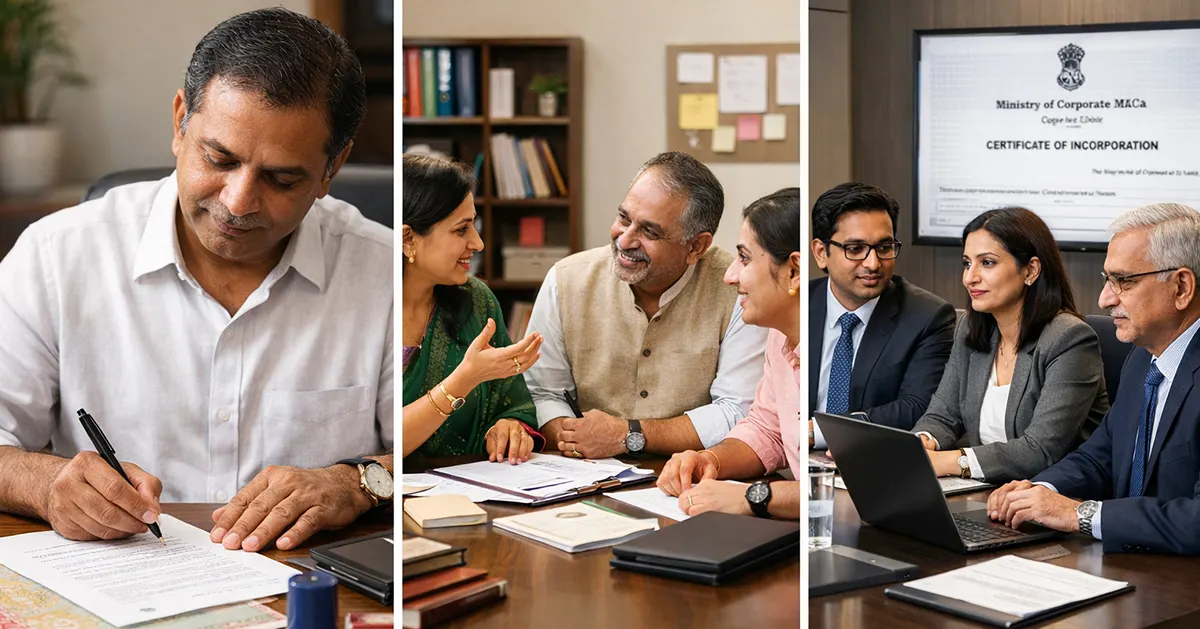
Introduction
Starting an NGO in India might seem like a daunting task due to the paperwork and regulatory requirements, but with the right guidance, the process can be simplified. Take, for instance, HopeRise, a fictional NGO founded to provide educational resources to underprivileged children. While the group had a noble vision, they were overwhelmed by the complexities of the registration process, especially the costs and compliance measures. Like many others, they found it difficult to navigate the registration process due to unclear expectations regarding the NGO Darpan registration costs and other associated expenses.
In this comprehensive guide, we’ll provide you with a detailed breakdown of the costs involved in registering your NGO with the NGO Darpan portal, highlight common hidden charges, and explain the ongoing compliance expenses that may arise post-registration. Whether you are just beginning or managing an established NGO, this article will equip you with the knowledge needed to effectively plan and manage the NGO Darpan registration costs with NGO Darpan.
What is NGO Darpan Registration?
The NGO Darpan portal is an initiative by NITI Aayog, providing NGOs with an opportunity to enhance their visibility and credibility within India’s social sector. It’s a government-backed platform that assigns NGOs a Unique Identification Number (UID), ensuring transparency and accountability. This identification number is necessary for accessing government grants, collaborating with other organizations, and building trust with donors.
As of early 2025, over 294,478 NGOs have registered on the portal, highlighting its central role in India’s non-profit ecosystem. Registering your NGO on this portal is an essential step toward increasing your organization’s chances of receiving government funding and ensuring legal compliance. Importantly, the NGO Darpan registration costs itself is free, but there are additional costs involved in establishing and maintaining your NGO’s operations.
Is There a Fee for NGO Darpan Registration?
The NGO Darpan registration costs are free of charge. The registration process on the portal does not require any upfront payments. However, while registering on the NGO Darpan portal is free, there are other hidden costs that NGOs must plan for, such as document preparation, legal consultations, and professional services.
Key Costs to Consider:
- Document Preparation: To be registered as an NGO, you may need to prepare several documents, such as a trust deed or a memorandum of association, which may require the help of a professional.
- Legal Consultations: Legal advice is often necessary to ensure that your NGO complies with the relevant laws. This could cost anywhere between ₹5,000 to ₹20,000, depending on the complexity of your NGO’s setup.
Though the registration itself doesn’t cost anything, understanding these additional charges will help you avoid unexpected expenses down the road.
Breakdown of Costs Associated with NGO Registration and Compliance
While the NGO Darpan registration is free, the cost of establishing and maintaining an NGO involves various other fees and compliance-related expenses. These costs can vary significantly depending on the type of legal entity you choose for your NGO and the services you need.
1. Legal Entity Registration:
- Trust Registration: To register a trust, you need to draft a trust deed and pay state-specific registration fees, which could vary based on location.
- Society Registration: Registering a society requires a memorandum of association, which is a document outlining the goals and objectives of your NGO. Additionally, there are state-specific fees for registering a society.
- Section 8 Company: If you choose to incorporate as a Section 8 company under the Companies Act, you’ll incur costs related to name approval, incorporation fees, and other statutory charges. This can range from ₹10,000 to ₹50,000.
2. Professional Fees:
- Drafting legal documents, obtaining legal advice, and managing registration requirements can involve professional fees ranging from ₹5,000 to ₹25,000.
- These expenses can vary depending on the complexity of your NGO’s formation and the service providers you choose.
3. Compliance and Reporting Costs:
NGOs are required to maintain annual filings, submit financial reports, and get audits done. Here’s a look at the common compliance costs:
- Audit Fees: The annual audit fee typically ranges from ₹10,000 to ₹50,000, depending on your NGO’s size and the services of the auditor.
- Annual Filings: Regular submission of financial statements and activity reports to the government is required to maintain compliance. Professional fees may be incurred if you hire accountants or legal professionals for these tasks.
While the registration itself is free, NGOs need to remain compliant with various statutory requirements throughout their operations. Below are some of the ongoing costs associated with NGO Darpan compliance:
- Annual Filings and Reports: NGOs must file annual activity reports and financial statements to maintain their legal status. These filings are mandatory to comply with the regulations set by the government, and professional assistance can incur additional costs.
- Audit Fees: An annual audit is a requirement for NGOs to ensure transparency. Certified auditors charge between ₹10,000 and ₹50,000 based on the size and financial complexity of the NGO.
- Tax Compliance: If your NGO is eligible for tax exemptions under Section 12A and 80G of the Income Tax Act, there are associated legal fees for obtaining these exemptions. Donors benefit from these exemptions, making it a crucial step for NGOs.
- Foreign Contributions (FCRA Registration): If an NGO wishes to receive foreign funds, it must register under the Foreign Contribution Regulation Act (FCRA), which involves a separate process and additional fees. NGOs may also need to submit regular reports under the FCRA.
One of the significant advantages of registering with the NGO Darpan portal is the access it provides to funding opportunities. Registered NGOs can apply for over 100 government grants, with a focus on ministries like Rural Development, Women and Child Development, and Social Justice.
Key Government Grants:
- The government is increasingly funding social causes, particularly those aligned with sustainable development, education, healthcare, and social justice.
- The NGO Darpan portal acts as a gateway to these grants and can help NGOs secure crucial funding for their projects.
Corporate and International Funding:
- As CSR funding becomes more prevalent, NGO Darpan can also facilitate partnerships with corporations looking to align with social initiatives.
- Additionally, international donors are keen to fund NGOs that have credibility, and being registered on NGO Darpan enhances an NGO’s ability to attract such funding.
How to Avoid Hidden Charges in NGO Darpan Registration Costs
Although the registration process itself is free, certain hidden costs can catch NGOs off guard. Here’s how to avoid them:
- Clarify Service Fees: Always get a clear breakdown of the fees involved when hiring professionals for services like document preparation or legal consultations.
- Understand Documentation Requirements: Be thorough in understanding the documents needed for registration. For example, make sure your trust deed is legally compliant to avoid future complications.
- Research Thoroughly: By staying informed about the registration process, you can avoid unnecessary costs associated with errors or incomplete applications.
Conclusion
The NGO Darpan portal is a critical resource for NGOs in India, offering access to government funding, CSR opportunities, and global partnerships. While the NGO Darpan registration costs are free, NGOs should be aware of the additional costs associated with registration and ongoing compliance.
Platforms like RegisterKaro play a crucial role in guiding NGOs through the registration process, helping them navigate the structure for NGO Darpan registration costs and ensuring compliance with legal requirements. By understanding and planning for the costs involved, NGOs can set themselves up for long-term success.
How RegisterKaro Helps
RegisterKaro provides end-to-end services that ensure NGOs are compliant with all legal and regulatory requirements. They offer comprehensive assistance, from entity registration to compliance management, ensuring a smooth experience. With RegisterKaro, NGOs can avoid the confusion around NGO Darpan compliance fees and focus on making an impact.
For more information on NGO Darpan registration costs and compliance, visit RegisterKaro’s NGO services.




